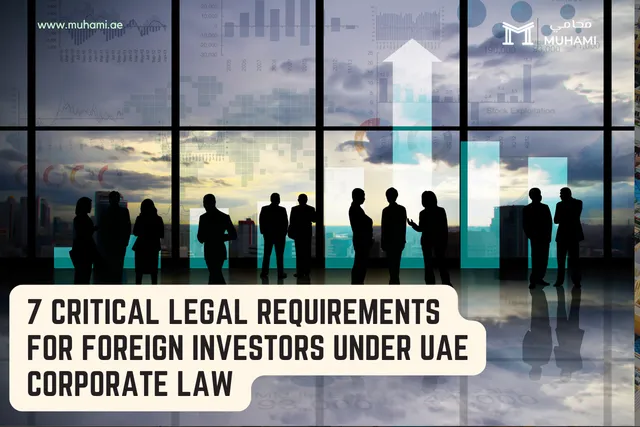Structuring Joint Ventures in the UAE: Legal Considerations for Foreign Investors

The United Arab Emirates (UAE) continues to attract foreign investors seeking commercial opportunities in the region. With robust infrastructure, strategic market access, and progressive economic reforms, the UAE offers a favourable environment for joint ventures (JVs).
While recent legal changes have opened the door for 100% foreign ownership in many sectors, JVs remain common especially where local knowledge, licensing, or sectoral restrictions make it practical or necessary to collaborate with a UAE-based partner.
Understanding the legal structure, documentation, and regulatory obligations of JVs is essential to building a successful partnership.
Types of Joint Venture Structures
Joint ventures in the UAE typically fall into three categories. The first is a contractual joint venture, which is created through an agreement between the parties without forming a separate legal entity. This model is ideal for short-term projects or specific business collaborations.
The second type is an equity-based joint venture, where the parties establish a new company, commonly a Limited Liability Company (LLC) or a Private Joint-Stock Company (PrJSC), to conduct the JV business.
The third option includes unincorporated partnerships, which, under UAE corporate tax law, may elect to be treated as taxable entities, allowing greater flexibility in tax planning.
Choosing the Legal Vehicle & Jurisdiction
Mainland vs Free Zone vs Financial Free Zone (ADGM/DIFC)
Selecting the right legal setup and jurisdiction is a critical decision in structuring a JV. Foreign investors can choose to set up on the mainland, in a free zone, or in a financial free zone such as the Abu Dhabi Global Market (ADGM) or the Dubai International Financial Centre (DIFC).
Mainland JVs fall under the UAE Commercial Companies Law and are best for businesses targeting the wider UAE market. Free zones offer 100% foreign ownership and simplified set-up procedures but typically limit business activities to within the free zone or internationally.
Financial free zones such as DIFC and ADGM apply English common law and offer more robust corporate governance structures, which can simplify enforcement of JV terms and shareholder rights.
Ownership & Regulatory Considerations
While recent legal reforms have removed the 51% local ownership requirement for many mainland business activities, strategic sectors such as energy, defense, and telecommunications may still require Emirati involvement.
In all cases, investors must assess licensing requirements, capital thresholds, and compliance with the UAE’s Foreign Direct Investment (FDI) Law. It is important to verify the allowed ownership limits based on the business activity and the Emirate in which the company will be registered, as rules may vary.
Essential Legal Agreements & Governance Documentation
A well-drafted Joint Venture Agreement (JVA) lies at the heart of any successful JV. It should clearly define the business purpose, capital contributions, roles and responsibilities of each party, profit-sharing terms, board structure, and decision-making powers.
Depending on the structure, the parties may also execute a Memorandum of Association (MOA), Memoranda of Understanding (MOU), Shareholder Agreements, and, where applicable, management or distribution agreements.
If one party is granted a Power of Attorney (PoA) to act on behalf of the JV or its shareholders, it must be understood that UAE law permits revocation of PoA, even if labelled as “irrevocable.” Careful legal drafting is essential to limit associated risks.
Dispute Resolution & Exit Mechanisms
Given the diversity of parties and interests in a JV, dispute resolution planning is critical. Arbitration is a preferred method in the UAE, particularly under institutions like DIAC (Dubai International Arbitration Centre), or ADGM Arbitration Centre, due to confidentiality and enforceability.
JV agreements should include mechanisms for resolving deadlocks, defining exit procedures, and handling breaches. Common provisions include put and call options, tag-along or drag-along rights, and pre-agreed valuation methods for share buyouts. Selecting an appropriate governing law and dispute resolution forum helps ensure that the agreement is enforceable and disputes can be resolved efficiently.
Liability & Governance Compliance
In equity-based JVs, entities such as LLCs and PJSCs provide limited liability protection to shareholders, shielding them from business losses beyond their investment.
However, companies must adhere to the governance requirements laid out in UAE law. This includes shareholder approvals for major decisions, notarization of constitutional documents, board meeting protocols, and compliance with statutory reporting obligations. These formalities ensure transparency and prevent internal conflicts.
Tax & Financial Implications
With the introduction of the UAE corporate tax regime effective from June 2023, joint ventures must assess their tax obligations. Unincorporated JVs can elect to be treated as taxable entities, enabling them to file as a separate unit. Incorporated JVs, such as LLCs, are automatically subject to corporate tax on their profits exceeding AED 375,000 at the standard 9% rate.
Foreign investors should also consider VAT registration if the JV’s revenue exceeds the mandatory threshold. Proper structuring and tax planning are essential to remain compliant and avoid penalties.
Timeline & Process
Setting up a contractual joint venture can be done relatively quickly, as it does not require company formation. These are often finalized with a written agreement and a commercial registration or permit, depending on the activity.
In contrast, an equity-based joint venture involves several steps, including drafting legal documents, forming the entity, applying for licenses, opening bank accounts, and setting up the board of directors. This process may take several weeks, but it ensures a more stable and scalable legal structure.
Key Risks & Strategic Focus Areas
Joint ventures involve several risks that foreign investors must manage. Misalignment in governance expectations, unclear exit terms, misuse of PoAs, and failure to consider local regulations can all derail the venture.
Jurisdictional choices also matter, setting up in the wrong free zone may restrict the business’s operations or complicate the enforcement of agreements. Therefore, it is vital to align the business strategy with the legal structure from the start.
Best Practice Recommendations
To reduce risks, foreign investors should conduct comprehensive due diligence on potential partners, including legal, commercial, and cultural factors. JV agreements should be tailor-made, addressing not just basic commercial terms but also board control, reserved matters, exit rights, and dispute mechanisms.
For added flexibility, many investors use holding structures in financial free zones like ADGM or DIFC where common law protections support more investor-friendly outcomes. Lastly, engaging qualified legal counsel ensures the JV is structured in line with UAE law while protecting long-term commercial objectives.
Get Expert Legal Advice on Structuring Joint Ventures in the UAE with SK Legal
Structuring a joint venture in the UAE involves key decisions, from jurisdiction and ownership to governance, tax, and dispute resolution considerations. At SK Legal, we offer expert legal guidance to foreign investors in structuring JVs under UAE corporate law. Our services include:
- Comprehensive Legal Consultancy: Our expert team provides clear, personalised legal advice on JV structuring, documentation and compliance.
- Efficient Policy Review and Implementation: We assist foreign investors in drafting JVAs, MOAs, governance policies and exit mechanisms in line with UAE companies law.
- Specialised Legal Support: Our experienced lawyers handle every aspect of JV formation—licensing, regulatory approvals, tax elections and dispute resolution frameworks.
For personalised assistance and expert legal advice on joint ventures in the UAE, contact us at [email protected].
Any Questions?
Connect with lawyers and seek expert legal advice
Share
Find by Article Category
Browse articles by categories
Featured Partnership
She Knows Best
Anonymous Advice, For Women By Women
Related Articles

What to Do When Your Landlord in Dubai …
When Your Landlord in Dubai Ghosts You Over Your Deposit That Silent Treatme…

What to Do When Your Landlord in Dubai Ghosts You…
When Your Landlord in Dubai Ghosts You Over Your …

Investing Off-Plan in Dubai: The Risks …
I still remember meeting an investor a few years ago who had bought into an off…

Investing Off-Plan in Dubai: The Risks You Face &…
I still remember meeting an investor a few years …

7 Critical Legal Requirements for Forei…
The United Arab Emirates (UAE) has emerged as a global business hub. Its strate…

7 Critical Legal Requirements for Foreign Investo…
The United Arab Emirates (UAE) has emerged as a g…
